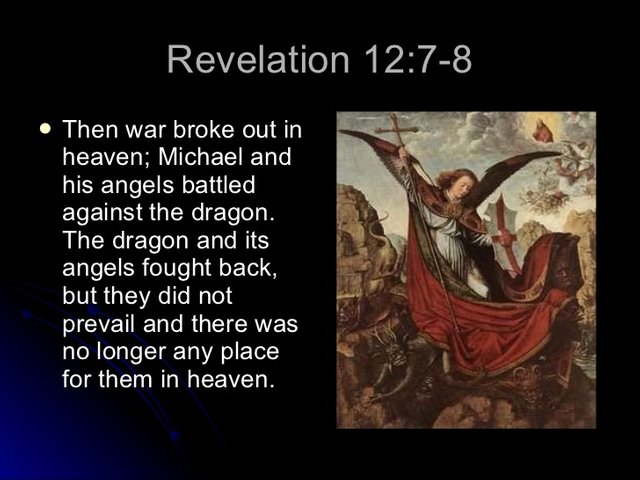DOES CHRISTIAN AND MUSLIM BELIEVE ON ANGELS????
YES BOTH BELIEVE ON ANGELS MICHAEL

ST Michael the Archangel, whose name means, “one who is like God,” led the army of angels who cast Satan and the rebellious angels into Hell. According to Revelation 12:7

Archangel Michael is mentioned three times in the Book of Daniel. The idea that Michael was the advocate of the Jews became so prevalent that, in spite of the rabbinical prohibition against appealing to angels as intermediaries between God and his people, Michael came to occupy a certain place in the Jewish liturgy. In the New Testament Michael leads God's armies against Satan's forces in the Book of Revelation, where during the war in heaven he defeats Satan. In the Epistle of Jude Michael is specifically referred to as "the archangel Michael". Christian sanctuaries to Michael appeared in the 4th century, when he was first seen as a healing angel, and then over time as a protector and the leader of the army of God against the forces of evil.
The early Church Fathers recognized the importance of the angels and archangels, particularly St. Michael. Theodore of Cyr (393-466) in his Interpretation of Daniel wrote, “We are taught that each one of us is entrusted to the care of an individual angel to guard and protect us, and to deliver us from the snares of evil demons. Archangels are entrusted with the tasks of guarding nations, as the Blessed Moses taught, and with those remarks the Blessed Daniel is in accord; for he himself speaks of ‘the chief of the Kingdom of the Persians,’ and a little later of ‘the chief of the Greeks,’ while he calls Michael the chief of Israel.'” The Church Fathers would also posit that St. Michael stood guard at the gate of paradise after Adam and Eve had been banished, and he was the angel through whom God published the Ten Commandments, who blocked the passage of Balaam according to Number 22:20 and who destroyed the army of Sennacherib (2 Chronicles 32:21). St. Basil and other Greek Fathers ranked St. Michael as the Prince of all the Angels. With the rise of scholasticism and the exposition of the “nine choirs of angels,” some said St. Michael was the prince of the Seraphim, the first of the choirs. (However, St. Thomas Aquinas assigned St. Michael as the prince of the last choir, the angels.) St. Michael the Archangel has been invoked for protection on various occasions. In 590, a great plague struck Rome. Pope St. Gregory the Great led a procession through the streets as an act of penance, seeking the orgiveness of and atoning for sin. At the tomb of Hadrian (now Castle Sant’ Angelo near St. Peter’s Basilica), St. Michael appeared and sheathed his sword, indicating the end of the plague. The Holy Father later built a chapel at the top of the tomb and to this day a large statue of St. Michael rests there. Therefore, in our Catholic tradition, St. Michael has four duties:
- To continue to wage battle against Satan and the other fallen angels
- To save the souls of the faithful from the power of Satan especially at the hour of death.
- To protect the People of God, both the Jews of the Old Covenant and the Christians of the New Covenant; and
- Finally to lead the souls of the departed from this life and present them to our Lord for the particular judgment, and at the end of time, for the final judgment.
For these reasons, Christian iconography depicts St. Michael as a knight-warrior, wearing battle armor, and wielding a sword or spear, while standing triumphantly on a serpent or other representation of Satan. Sometimes he is depicted holding the scales of justice or the Book of Life, both symbols of the last judgment.
As Catholics, we have remembered through our liturgical rites the important role of St. Michael in defending us against Satan and the powers of evil. An ancient offertory chant in the Mass for the Dead attested to these duties: “Lord, Jesus Christ, King of Glory, deliver the souls of all the faithful departed from the pains of Hell and from the deep pit; deliver them from the mouth of the lion that Hell may not swallow them up and that they may not fall into darkness, but may the standard-bearer Michael conduct them into the holy light, which thou didst promise of old to Abraham and his seed. We offer to thee, Lord, sacrifices and prayers; do thou receive them in behalf of those souls whom we commemorate this day. Grant them, Lord, to pass from death to that life which thou didst promise of old to Abraham and to his seed.”
In the Tridentate Mass since the 1200s, St. Michael was invoked in the Confiteor, along with the Blessed Virgin Mary, St. John the Baptizer, and Saints Peter and Paul; the invocation of these saints inspired the faithful to remember the call to holiness and the sinfulness of the Church Triumphant in Heaven.
For the greater part of the twentieth century, the faithful recited the prayer to St. Michael at the end of the Mass. Pope Leo XIII (d. 1903) had a prophetic vision of the coming century of sorrow and war. After celebrating Mass, the Holy Father was conferring with his cardinals. Suddenly, he fell to the floor. The cardinals immediately called for a doctor. No pulse was detected, and the Holy Father was feared dead. Just as suddenly, Pope Leo awoke and said, “What a horrible picture I was permitted to see!” In this vision, God gave Satan the choice of one century in which to do his worst work against the Church. The devil chose the twentieth century. So moved was the Holy Father from this vision that he composed the prayer to St. Michael the Archangel: “St. Michael the Archangel, defend us in battle! Be our protection against the wickedness and snares of the devil. May God rebuke him, we humbly pray, and do thou, O Prince of the heavenly host, by the power of God, thrust into Hell Satan and all the other evil spirits who roam about the world seeking the ruin of souls.” Pope Leo ordered this prayer said at the conclusion of Mass in 1886. (When Pope Paul VI issued the Novus Ordos of the Mass in 1968, the prayer to St. Michael and the reading of the “last gospel” at the end of the Mass were suppressed.)
Finally, St. Michael figures prominently in the Rite of Exorcism, particularly in the case of diabolical infestation of places. Here the priest prays: “Most glorious Prince of the heavenly Army, Holy Michael the Archangel, defends us in battle against the princes and powers and rulers of darkness in this world, against the spiritual iniquities of those former angels. Come to the help of man whom God made in his own image and whom he bought from the tyranny of Satan at a great price. The Church venerates you as her custodian and patron. The Lord confided to your care all the souls of those redeemed, so that you would lead them to happiness in Heaven. Pray to the God of peace that he crush Satan under our feet; so that Satan no longer be able to hold men captive and thus injure the Church. Offer our prayers to the Most High God, so that His mercies are given us soon. Make captive that Animal, that Ancient serpent, which is enemy and Evil Spirit, and reduce it to everlasting nothingness, so that it no longer seduces the nations.”
In the spring of 1994, our Holy Father, Pope John Paul II, urged the faithful to offer the prayer to St. Michael the Archangel. He also made the strong suggestion that the recitation of the prayer be instituted at Mass once again. (Note that the Holy Father did not mandate the recitation of the prayer at Mass.) Clearly, the Holy Father was responding to the grave evils we see present in our world– the sins of abortion, euthanasia, terrorism, genocide, and the like. Satan and the other fallen angels are doing their best to lead souls to Hell. We need the help of St. Michael! For this reason, many parishes have erected a shrine in St. Michael’s honor or offer the prayer in his honor at the conclusion of Mass
ISLAM
In Islam, Mikail (Michael) is one of the four archangels along with Jibrail, Israfil and Azrail. The Quran mentions him in 2:98. He provides nourishment for bodies and souls and is also responsible for nature events. Mikail is often depicted as the archangel of mercy. Therefore, he is said to be friendly, asking God for mercy for humans and is said to be one of the first who bowed down before Adam. Furthermore, he is responsible for the rewards doled out to good persons in this life.
St. Michael oil
christain make use of the St. Michael oil and pray with Saint Michael to chase away evil in and around your home. Keep the bottle of oil open in the room where the troubles usually occur, and watch the evil go away. Also wear on your neck to keep the evil and devil away from you and to stay protected. You can also dress a spiritual candle to increase the power of the candle burning ritual it may shock to know that Muslim also make use of the St. Michael oil. THANKS TO GOD FOR THAT

Speaking from Christian angle I will say Yes
To the question in your title, my Magic 8-Ball says:
Hi! I'm a bot, and this answer was posted automatically. Check this post out for more information.
It doesn't matter what Muslims believe. Islam is a false religion created by Satan.
Nobody should ever pray to angels or anyone else except God alone. To do so violates the first commandment.